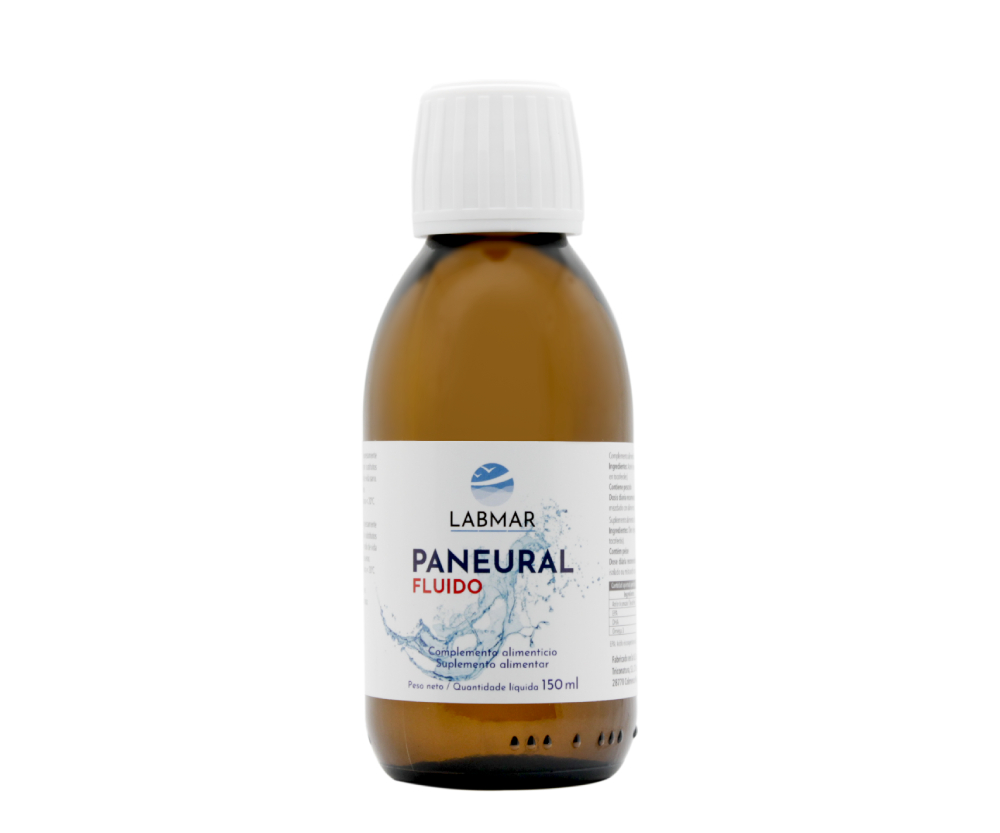
Composición
Óleo de peixe, aroma natural de limão, antioxidante (extrato rico em tocoferóis). Desodorizado
(zero sabor de peixe).
500 mg de DHA e 350 mg de EPA
(Composição por dose de 5 ml)
Composición
Óleo de peixe, aroma natural de limão, antioxidante (extrato rico em tocoferóis). Desodorizado
(zero sabor de peixe).
500 mg de DHA e 350 mg de EPA
(Composição por dose de 5 ml)

Advertências
Armazenar num lugar fresco (15°C-20°C) e seco, protegido da luz solar. Não consumir em caso de alergia ou hipersensibilidade ao peixe ou a algum dos seus componentes.
A utilização de suplementos de óleo de peixe pode interferir com o consumo de fármacos anticoagulantes.
Forma de apresentação
Frasco de 150 ml
Modo de utilização
Tomar 5 ml por dia, isolado ou misturado com a comida.
Bibliografia
1. J.C. McCann,B.N. Ames. Is docosahexaenoic acid, an n-3 long-chain polyunsaturated fatty acid, required for development of normal brain function? An overview of evidence from cognitive and behavioural tests in humans and animals .Am J Clin Nutr, 82 (2005), pp. 281-295
2. R.T. Pivik,R.A. Dykman,H. Jing,J.M. Gilchrist,T.M. Badger. Early infant diet and the omega 3 fatty acid DHA: effects on resting cardiovascular activity and behavioral development during the first half-year of life. Dev Neuropsychol, 34 (2009), pp. 139-158
3. A.L. Colter,C. Cutler,K.A. Meckling. Fatty acid status and behavioural symptoms of Attention Deficit Hyperactivity Disorder in adolescents: A case-control study. Nutr J, 7 (2008), pp. 8
4. J.P. Schuchardt,M. Huss,M. Stauss-Grabo,A. Hahn. Significance of long-chain polyunsaturated fatty acids (PUFAs) for the development and behaviour of children. Eur J Pediatr, 169 (2010), pp. 149-164
5. R. Uauy,A.D. Dangour. Fat and fatty acid requirements and recommendations for infants of 0–2 years and children of 2–18 years. Ann Nutr Metab, 55 (2009), pp. 76-96
6. B. Koletzko,E. Lien,C. Agostoni,H. Böhles,C. Campoy,I. Cetin,World Association of Perinatal Medicine Dietary Guidelines Working Group. Recommendations and guidelines for perinatal practice. The roles of long-chain polyunsaturated fatty acids in pregnancy, lactation and infancy: review of current knowledge and consensus recommendations.J Perinat Med, 36 (2008), pp. 5-14



